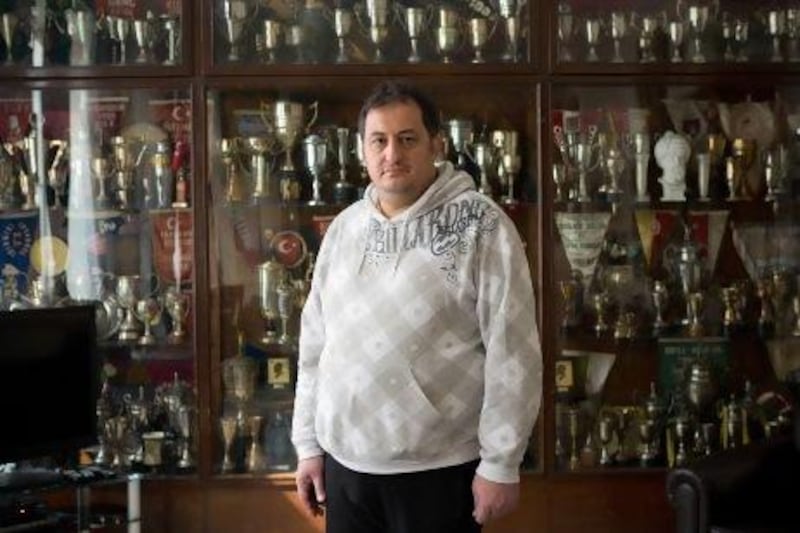ISTANBUL // Born into Turkey's small Greek minority in Istanbul, Dimitris Panayotu moved to Athens with his parents as a small child.
But after losing his job in the crisis that has devastated the Greek economy, he returned to the city of his birth a year ago and now works a few hundred metres from the hospital where he was born.
"I see no future in Greece," said Mr Panayotu, 41, on a recent morning, as he was sitting in a trophy-filled room of the Beyoglu Sports Club, founded by Istanbul's Greek community in the eponymous district in Istanbul in 1884.
Mr Panayotu has found a job as the club's administrator and guide for Greek tourists.
He said club officials offered him the post during a visit to Istanbul a few years ago and, after he lost his work in the logistics sector in Athens, he took up a position there.
"They were looking for someone who speaks Greek," he said. "I took two suitcases and came."
Mr Panayotu is one of an increasing number of Greeks who are moving to Turkey to escape the economic crisis at home.
That crisis has sent the unemployment rate to 27 per cent, while the economy crashed, shrinking by 6.4 per cent last year. As the Greek economy went into nosedive, Turkey enjoyed an unprecedented period of growth, with 8.8 per cent in 2011 and 2.2 per cent last year.
There are no official figures about the size of the migration, but the Ecumenical Patriarchate of Constantinople, the seat of Patriarch Bartholomew I, the leader of the Greek Orthodox Church, says it has in the last two years received several hundred queries by Greek citizens considering such a move.
Observers say the trend is based on economic reasons, geographical proximity and a special Turkish-Greek affinity that is alive despite decades of political tensions between the two countries
Rivalry and hostility between Turkey and Greece dating back decades has been pushed aside in recent years by a rapprochement that has led to a steep rise in trade and closer political ties.
Bilateral trade, dominated by Turkish exports, has almost doubled since 2009, to just under US$5 billion (Dh18.4bn) last year.
About 670,000 tourists from Greece visit Turkey every year and Istanbul is their main destination. The city was home to tens of thousands of Greeks until the 1950s, but hostility against Greeks and other minorities in Turkey drove many of them out. Today, only about 3,000 Greeks are left.
Some of the tourists make their way to Mr Panayotu at the Beyoglu Spor Kulubu. For them, the club building is a landmark, because its members founded two of the leading football clubs in Greece, Athletic Union of Constantinople (AEK) in Athens, and the Pan-Thessanolician Athletic Club of Constantinopolitans (PAOK) in the north-eastern Greek city of Thessaloniki.
"It's the mother of those two clubs," Mr Panayotu said.
His family left Istanbul when he was just two months old, "because everyone was going", he said. "I was raised in Athens. My parents never wanted me to learn Turkish, because we were Greek." Even working in Istanbul today, he struggles with the language. "Fate has given us something else" from what his parents expected, he said.
But Mr Panayotu said he had adapted to his new life. His wife has joined him in Istanbul with their daughter, 3.
"It was best to come here, because I have a job," he said.
Dimitrios Triantaphyllou, a political scientist from Greece and the director of the Center for International and European Studies at Istanbul's Kadir Has University, said while most of the people leaving Greece were moving to the US or western countries, Turkey had attracted a number of migrants as well.
"I have had a steady flow of requests [from Greeks] to work here for more than a year," he said.
Mr Triantaphyllou has been working in Istanbul since September 2010. He said his own move to Turkey was not linked to the crisis in Greece, but to the chance to teach at a Turkish university and run a research centre, which was "an opportunity that was difficult to resist".
"The political rapprochement is another factor. There is also the perception that the Turkish economy is booming. I was teaching in Rhodes before I came here, and lots of my former students are here now. This is an investment for their families."
Alexandros Kampouris, a volunteer at IHO, a daily newspaper for the Greek Orthodox community in Istanbul, said people from Greece were hoping for a job in Istanbul because they had heard about Turkey's economic boom, but not everyone was able to find work. "They are always coming and going," he said.
Popular Turkish TV series on Greek TV had also heightened the interest of would-be immigrants from Greece, said Niki Christopoulou, who produces a Greek radio programme at the IHO office, upstairs from Mr Panayotu's sports club.
She said a Turkish TV drama about the life of an Ottoman Sultan and other television series from Turkey had been very successful on Greek television.
"That is a good thing in general, but it is getting out of hand," Ms Christopoulou said with a smile. "Relatives from Greece are calling me to ask what will happen in the next episode" of one Turkish TV show or another, she said. "But I don't even own a television set."
twitter: For breaking news from the Gulf, the Middle East and around the globe follow The National World. Follow us






